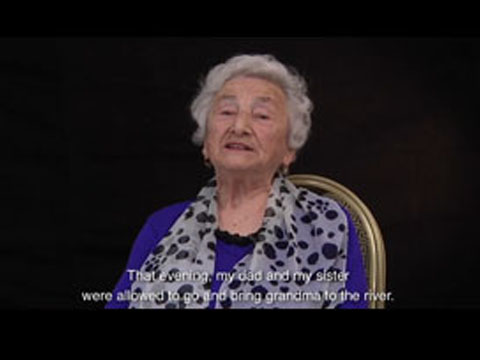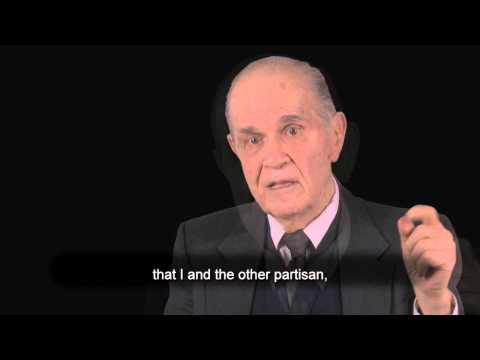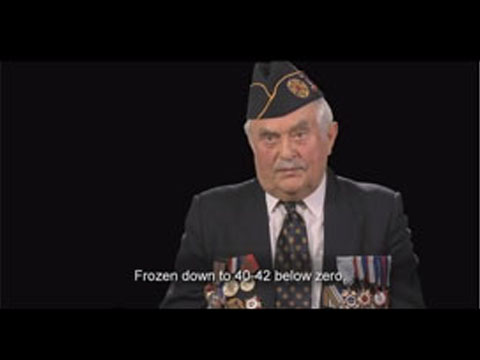
Fira Oussatinkski
Born Zguritsa, Bessarabia (Moldova)
Interviewed In: Edmonton, Alberta
Medals Awarded: Victory over Germany In The Great Patriotic War
“The village starosta told the Germans that I was his nephew”
Armoured Vehicle Driver At Intelligence Battalion. 5th Tank Division Stationed In Alitus, Lithuania.
“The
Philip was initially stationed with an intelligence battalion in Lithuania. They were sent to Belarus just after the Nazis invaded but arrived too late to stop them from occupying Minsk in 1941: “When passing through Minsk, the Germans had already occupied the city. They were in the city. And we lost the colours the colonel was sitting on a stump in the forest, nearly crying, pulling his hair out, saying: “They should kill me for losing the colours and the division. In short, the surviving personnel was transferred to a reserve tank regiment. We thought that the division would be formed over. However the division was disbanded. The reason: the colours had been lost.” After the retreat near Minsk, Philip was reassigned to a special Katusha artillery unit operating along the Moscow-Minsk Highway. With them he participated in The Defense Of Moscow Philip was injured by an explosion while fighting on the outskirts of the city. “I was wounded. The guys carried me to the forest, the forest! There were trenches there
from the Napoleonic war, you know in fact it was near Moscow, 300-400 km away from Moscow or less. They left me firewood, cut some branches, I had neither a greatcoat nor a waterproof cape, not even a field cap. They left me tobacco and matches. There was absolutely nothing to eat. I stayed lying there for 4 days and nights with no water, no bread, absolutely nothing to eat. I didn’t see any Germans there. A 10 year old boy pastured his cow and a few sheep there”
The boy eventually told his father about the wounded soldier lying in the forest. The father rescued Philip, having him pose as a cousin completing an apprenticeship on their farm while he recovered. This was necessary as the farm was in German held territory and Nazis turned the farmhouse into a base. Philip repaid the farmer’s kindness with carpentry work. He stayed with the family through the winter and kept his identity secret around the Germans. He is probably the only Jewish soldier to celebrate Christmas with Nazis:
“On December 25 they had their Christmas holiday. Everyone in the house was to sit around the table and make a gulp of vodka from the glass. Just one gulp for everyone. I was among them: the man, his children, and everyone, and the Germans. What if they knew who was among them.”
Another group of Red Army soldiers separated from their detachment came across the farm shortly after that Christmas, in early 1943. Philip helped them hide from the Germans and when it was safe, accompanied them back to the front lines. Commanding officers were suspicious that he had been away so long and assigned him to a penal unit near Smolensk. Philip was again wounded, this time by a sniper, but recovered in time to rejoin a regular riffle regiment. With that unit, he crossed through Poland and reached The Elbe River in Germany when the war ended in 1945.
Philip moved to Uzbekistan and started a family after the war. He later moved to Montreal.

Born Zguritsa, Bessarabia (Moldova)
Interviewed In: Edmonton, Alberta
Medals Awarded: Victory over Germany In The Great Patriotic War

Born September 24th 1924 in Vilno, Poland (now Vilnus Lithuania).
Interviewed In: Toronto, Ontario
Medals Awarded: Order of the Patriotic War (1st and 2nd Class) and Victory over Germany In The Great Patriotic War

Born January 6 1925 Desna, Poland.
Interviewed In: Toronto, Ontario
Medals Awarded: Order of the Patriotic War (1st and 2nd Class), Medal for Partisan of the Patriotic War (1st and 2nd Class), Medal for Courage, Medal for Battle Merit, Medal For Capture of Konigsberg and Victory over Germany In The Great Patriotic War